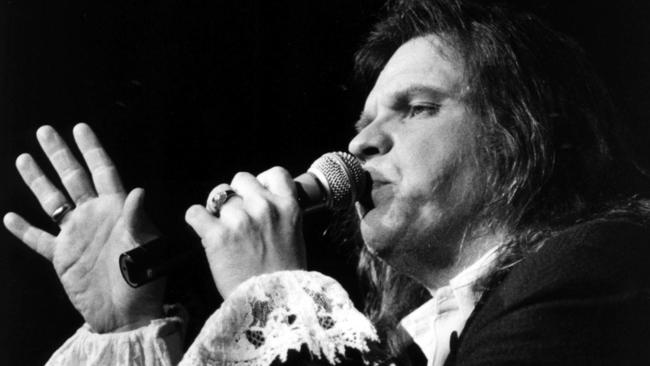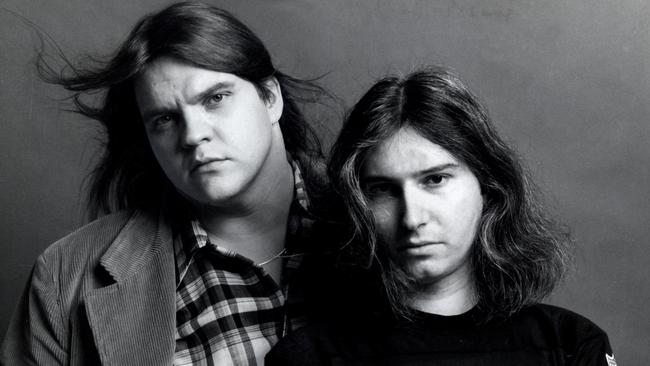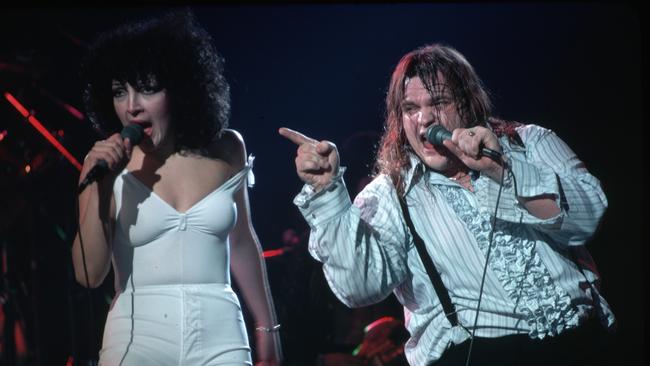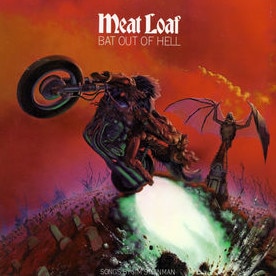The story behind Meat Loaf’s classic album Bat Out Of Hell
Record companies and producers had no faith, but Meat Loaf stuck with his mate Jim Steinman on Bat Out Of Hell, and he was proved right.

Meat Loaf was a big man with a huge voice, but thinning opportunities to find safe harbour in rock or on the stage.
The artist born Marvin Lee Aday had been in bands that supported major acts such as The Who, Janis Joplin, Joe Cocker, The Grateful Dead, Van Morrison and Bob Seeger. He’d also been in productions of Hair, the second on Broadway, and later an off-Broadway show called Rainbow. He would later score a role in The Rocky Horror Show.
But still something was missing. He might have made it with the cruelly overlooked album he recorded in 1971 for Motown.
Working there at the time were brothers Ralph and Russ Terrana. A year earlier, Russ had been given some tapes of the Jackson 5’s second album. Many producers had worked on it, including Motown boss Berry Gordy, but Gordy thought it messy. He asked Russ to remix it. It became a million-seller yielding two No.1 singles and launching the phenomenon.
Back to Meatloaf.
The Terrana brothers attended the Detroit production of Hair in 1970. Elsewhere, the musical had a hippy vibe, a tone set from the opening song, Aquarius.
When the moon is in the Seventh House
And Jupiter aligns with Mars.
But in Detroit – the pumping bicep of American sweaty rock whose high-energy roster back then boasted the likes of Iggy Pop and Ted Nugent – the tie-dyes, flowers and sandals were blasted aside by a young Meat Loaf and local blues singer Shaun Murphy (who called herself Stoney).
Ralph recalled to the Detroit Free Press last week: “He had radiators for lungs. He had so much power, and so did Stoney. That’s why we liked them together.”
The favoured brothers went to the office the next day and suggested Motown sign them.
The resulting album, Stoney & Meatloaf (corrected to Meat Loaf on later pressings), is a lost gem that confirms the vocal chops of both artists.
The single from it, What You See is What You Get, which only just charted, has the strong funk inflections of an Ike and Tina Turner hit.
Another track, (I’d Love To Be) As Heavy As Jesus, swings with punchy brass and Meat Loaf comes off sounding as like Blood Sweat & Tears’ booming front man, David Clayton-Thomas.
Alas, the second half of 1971 turned out to be rock music’s crowded hour. Albums in the charts (at the same time) included Tapestry, Imagine, Every Picture Tells a Story, Led Zeppelin 4, Sticky Fingers, Ram, Cosmo’s Factory, Aqualung, All Things Must Pass, Bridge Over Troubled Water, Who’s Next and LA Woman.
Stoney & Meat Loaf did one tour, the album tanked and they fell from consciousness. Stoney moved on to the Bob Seger Band – where she stayed 48 years.
Meat Loaf went on to try for a role in an offbeat New York Public Theatre production, More Than You Deserve, singing As Heavy As Jesus. It was Jim Steinman who had written the music. Steinman told Meat Loaf: “You’re as heavy as two Jesuses.”

History will recall Meat Loaf met another actor that day, Fred Gwynne. At 196cm, Gwynne would have stood out. In any case, he might have recognised him as the actor who played Herman Munster in 1960s TV sitcom The Munsters. Both were signed to perform.
The play didn’t go anywhere, but Meat Loaf and Steinman had crossed paths.
Jupiter had aligned with Mars.
Steinman had been working on various musical ideas, usually stage shows, since university days, and always writing music.
He was keen on the story of Peter Pan and saw in it the themes of rock and roll – never growing up, running away from home, gangs (the Lost Boys) and battles over turf (Neverland). His later hit with Meat Loaf, Heaven Can Wait (1977), was written for a futuristic Neverland fantasy.
Working at the piano, Steinman had written for himself two others: Bat Out of Hell and All Revved Up. Throughout 1975 he and Meat Loaf worked on Steinman’s songs in minute detail, expanding them into 20-minute operatic pop pageants crammed with everything alongside the bathroom sink.
The song Bat Out of Hell was Steinman’s contribution to the category popular in the late 1950s and early ’60s, the teenage death disc. Listed there are Leader of the Pack, Dead Man’s Curve and Tell Laura I Love Her, the first record Steinman bought. He planned to spectacularly bombast them all to pieces and did so across 9 minutes 52 seconds – 2.18 longer than those songs combined.
Meat Loaf did not write the songs, but insisted the track Paradise by The Dashboard Light was based on a frustrated vehicular romance from his high school days in Dallas.

In any case, as legend has it, they were arranged and written for him to sing. He and Steinman quickly became odd-couple best mates. “I grew up with Wagner, all of my heroes were larger than life,” Steinman would say.
They worked hard on distilling their songs into more workable lengths. Once they had the seven songs we know as the album Bat Out of Hell, they showcased it around 27 record companies, live in the office, but were rejected.
CBS’s Clive Davis, then the world’s most powerful music executive, was confronted by the performance. It was nothing like the musical fashions of the era. Davis told Steinman he couldn’t write songs, asked him had he ever listened to rock music and patronisingly sent the pair downstairs to buy some records.
Meat Loaf shouted profanities at Davis from the street below. Given he had no volume control, Davis couldn’t have missed it. (When Bat Out of Hell was released in 1977 it was through Cleveland International Records, whose parent was Epic Records, whose parent was CBS.)
They started playing small clubs with a Spinal Tap/Stonehenge-sized act. Just the two of them and before mere dozens of people. Industry types would regularly tell the singer that he was the star and should leave “the piano guy”. Meat Loaf was adamant: they were a team.
One night Steinman called his mate late. Steinman was at one of New York’s most famous clubs. “There’s a guy doing what we do down here at the Bottom Line,” he said. Meat Loaf stayed in bed. The guy was Bruce Springsteen.
In the end there was a hint of support, but there was a reluctance to risk too much. In stepped musical polymath Todd Rundgren.
Rundgren told me a few years ago that the first time he heard their songs he fell about laughing. He thought they were lampooning Bruce Springsteen and the E Street Band, and he wanted to be part of it.
In the end, E street members, Roy Bittan (keyboards) and Mark Weinberg (drums) played on Bat out of Hell. Much of the album was recorded with Rundgren at Bearsville studios at Woodstock in upstate New York and he heavily invested in it – $US75,000, a vast sum at the time. “A great annuity for me,” he tells people today.
He brought his genius to the project, playing guitar and weaving complex backing vocals – then came the moment Steinman asked Rundgren for the sound of a revving motorcycle.
Steinman told an interviewer once: “(Rundgren) goes, ‘I forgot to ask you. Is it a Yamaha, a Kawasaki, or a Harley-Davidson?’.” Steinman wanted a Harley-Davidson, to which Rundgren replies: “I thought so. Why did I even ask?”
Steinman further recalled: “He goes and adjusts three buttons on his guitar rack and did the motorcycle with his guitar. You hear it rev up, you hear the motor, you hear the fire coming out of it, and you hear it do a wheelie. I thought he was going to stop for gas.”
The album came out in October 1977. It wasn’t instantly popular. But then a DJ in Canada called Sandy Beach started playing Two Out of Three Ain’t Bad because of the lyric “You’ll never find your gold on a sandy beach”. Spectacular launch parties in Australia that had Harley-Davidsons ridden through the venue at full volume (yes, I was there) had us all talking about it and it took off here.
Britain’s biggest music television show of the era, Old Grey Whistle Test, played the live nine-minute version of the title track two weeks in a row. At last, America caught on. A bat was born.

Bat Out of Hell remains Australia’s biggest-selling album ever – going platinum 25 times. Meat Loaf would remain beloved by Australians until his death last week, (a dodgy performance at the 2011 AFL grand final was forgiven easily enough).
The Steinman-Meat Loaf partnership was broken last year with Steinman’s death. Meat Loaf told Rolling Stone: “I don’t want to die, but I may die this year because of Jim. I’m always with him and he’s right here with me now.”


To join the conversation, please log in. Don't have an account? Register
Join the conversation, you are commenting as Logout